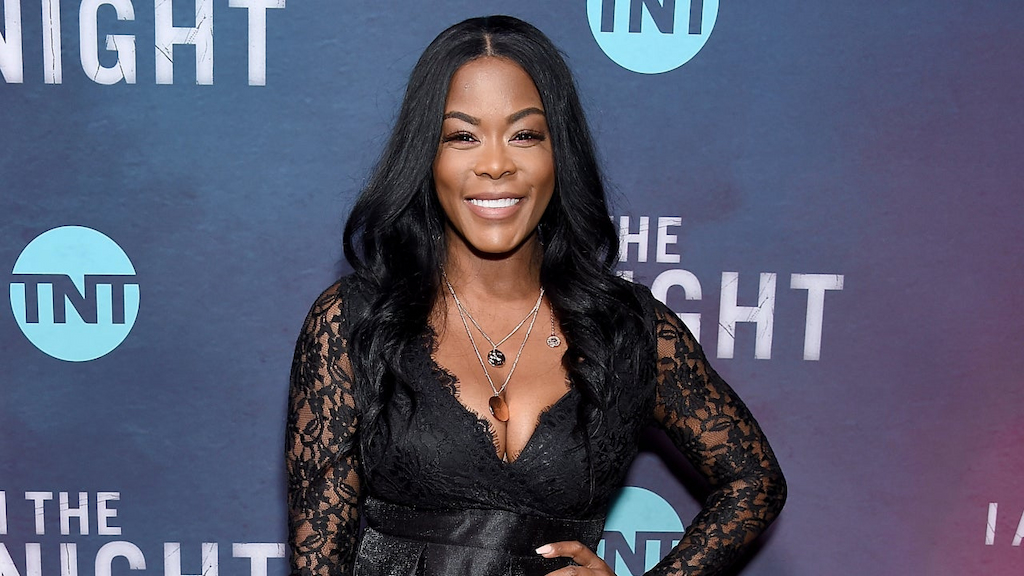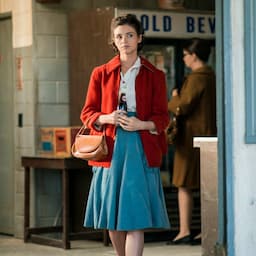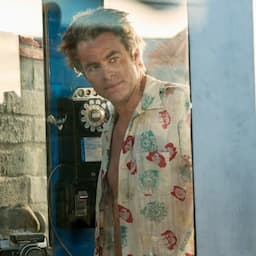The actress spoke to ET about why fans of the sitcom deserve "closure," and her new role on 'I Am the Night.'
Golden Brooks doesn’t mind becoming nearly unrecognizable in the new TNT mini-series, I Am the Night.
Fans of the hit show Girlfriends remember Brooks as “Maya Wilkes,” the no-nonsense lawyer's assistant who kept the entire law firm (and all of her friends) in line. In I Am the Night, Brooks stripped away the hair and makeup to portray Jimmie Lee Greenwade, an alcoholic emotionally abrasive mother raising her adopted daughter, Fauna “Pat” Hodel (played by India Eisley), who grew up believing that she was biracial. Hodel's search to find her true identity leads to the discovery of a sordid family history -- and a potential break in the notorious Black Dahlia murder case.
The six-part series, starring Chris Pine and Eisley, is the visual brainchild of Wonder Woman director Patty Jenkins. The story unfolds in a segregated Nevada town in 1965, and as Brooks learned when she filmed the series, time doesn’t heal all wounds -- especially racial traumas, broken family dynamics and what it’s like to be a child that doesn’t look like, or relate to, their parent.
In the nearly 20 years since Girlfriends went off the air, Brooks has appeared in over a dozen movies and television shows, but it hasn’t been easy landing roles. Playing Jimmie Lee became an opportunity for Brooks to show her range as a dramatic actress, in a business that tends to pigeonhole sitcom actors into one genre.
“You just have to keep working,” Brooks told ET via phone last Thursday. “I get told ‘no’ all the time, but one ‘yes’ from Patty Jenkins — and that’s a big yes — I think that ‘yes’ is going to springboard to other yeses. I’ll do the work. I’ll audition. I’ll go jump through hoops of fire because this is what I do. I signed up for it.”
The 48-year-old actress chatted with ET about channeling aspects of her childhood for I Am the Night, what she learned about herself in the process and the potential for a Girlfriends reunion.
ET: What drew you to this role?
Golden Brooks: I love period pieces. I went to U.C. Berkeley so I’ve studied Shakespeare, [Anton] Checkoff, [Henrick] Ibsen, August Wilson, I come from that world. So when I read the [I Am the Night] script and all those monologues, I thought: Jimmie Lee talks forever! This is what I do! [Laughs]. I just love characters who are flawed, and I wanted to do something where I wasn’t going to be in my lipstick, my hair, my pencil skirt. I wanted to show my other side.
What do you like about the character Jimmie Lee?
I love that it’s not the makeup and the hair. She’s stripped. She’s struggling like so many people in the world, trying to make the most of pretty much nothing. She is a victim of everything but I do think deep at the core of Jimmie Lee, there is love for Fauna.
How do you make Jimmie Lee seem like a lovable character despite her 'flaws'?
It’s based on a true story so I had to give her integrity. She got dealt a bad deck of cards and she did the best she could. I tried to find the human element of her. She’s not very nice to Fauna. But I think as you saw in that first episode, that tip that she gives to Chris Pine’s character [Jay Singletary], she knows what’s about to happen. She’s opened up pandora’s box.
There’s a scene in episode one where Fauna and her boyfriend are stopped by the police for essentially walking down the street together. How was it to tackle racism and segregation on the show given the current state of the country?
We’re in a fishbowl of racial issues that keep circling. They always make you remember that you are being marginalized whether it’s being black, being gay, being a woman, being Indian or Asian. I’m not saying that it’s all of America but we are constantly being reminded. The backdrop of I Am the Night is the Black Dahlia and film noir, which Patty [Jenkins] is so genius at covering. I think, visually, it’s beautiful — but there are race relations in that scene. I think about my mom, who is light skinned and lived in Oklahoma in the 1940s. She was able to pass [for white]. She was able to go in some diners that her sisters weren’t able to go into. When I got this role, I talked to my mom about [her experiences] and to know the anger and resentment she felt. As a brown-skinned woman, dealing with not looking like my mother, but she’s my hero, [you’re thinking] who am I in this family? Of course, I had anger [growing up], I questioned a lot of things. I used a lot of that in Jimmie Lee and how she saw Fauna.
What did you learn about yourself from shooting I Am the Night?
It brought up some stuff for me from sixth or seventh grade. I think I had a lot of pain. I had a lot of resentment towards — I’m going to have to be careful what I say because sometimes, it gets taken out of context — and I can only speak for me. But I think race relations in the ‘80s were different than now. Doing I Am the Night, because I am a method actress and I pull on my emotional library, there were things from the ‘80s that still bookmarked some of my pain. Maybe even my mother at times. She didn’t know it, because there’s nothing she could do about it because she loves me so much. But I was like, ‘Why don’t I look like her? Why don’t guys talk to me? Why do I eat lunch alone everyday? Why does my brother date girls that don’t look like me?' It just messed with me. In sixth grade, you’re in that awkward stage. I remember I was sitting in my room reading the Bible until 2 a.m. just praying to God, give me a sign that I am beautiful, that I’m okay. I lived with that for many years. I tried to explain it to my mom, she didn’t quite get it, but that’s okay. It wasn’t her job to truly get it, it was her job to love me and make a good person. And I believe that she did that. She worked two jobs to take care of me and my brother. She didn’t have time to break down my psychology.
It seems that the role allowed you to flip the narrative, to tackle colorism from a perspective of a mother, versus a child.
I raise my daughter differently [than my mother raised me], but that’s okay. The same with Jimmie Lee. If I have a wrench in my toolbox to build a house then that’s what I’m going to do. That’s what I pulled from [for the role]. When you are growing and developing, it's real pain, and so I used that. I would say from sixth grade to 11th grade. It was very hard.
How do you instill confidence in your daughter so that she doesn’t experience some of those same issues?
She’s very strong-willed. Her dad [D.B. Woodside] and I, even though we’re not together, we co-parent and instill so much in her. She’s a brown-skinned girl and she goes to a predominately white private school. There’s things that come up for her, we had a situation that came up not too long ago. But he and I come from a place where we tell her [positive things about herself]. I tell her you are stunning, you are a child of God and you walk with that. She’s 9, so there’s only so much [you can do] but she’s a strong little girl. We’re very close. She runs track so she’s around a lot of girls that are dark-skinned with different hair textures. She was [excited] because, at her school, there’s no one that looks like her. I knew the value of that and how important it was for her.
Speaking of representation, do you see any progress in Hollywood’s diversity issue?
I always think there’s room for growth. I come from back when there was UPN. Moesha, The Parkers, Girlfriends, Homeboys in Outer Space, Eve -- on Monday nights, you knew you were going to see about four or five shows that represented you. Albeit they were all comedies, but you had that [representation]. I try to always look at the glass half full. I look at one of my dearest friends, Regina Hall, and I look at her career and where things are going. From Scary Movie to Girls Trip, to When the Bow Breaks. She’s now leading movies, she’s [no longer] just "the funny girl." That’s something that she’s always had in her, but she’s just now being given that opportunity to do it because there’s a need for it and people understand that we’re marketable. I think that shows like Girlfriends and Living Single, these images and knowing that they are expected and loved and wanted by society, and not just the black demographic. Girlfriends [had fans] across the board. I think the show was a springboard for character’s like Cookie [Lyons] and Olivia Pope. I mean, look at Regina King and what’s happening with her career! If you stay the course, this business will catch up to you and I think that’s happening with black women. Hollywood is catching up. Yes, I would love to see more, there’s so many women out there who are so good. But is there enough content for all the talent that’s out there? I don’t know. That’s why I’m going to keep writing.
Girlfriends celebrates its 19th anniversary this year, is there a reunion in the works?
A few years ago myself, Tracee [Ellis Ross], Jill [Marie Jones], Persia [White] and Reggie [Hayes], met with Mara [Brock Akil] to talk about what it would look like — a TV movie, or a big screen movie? The thing is, it’s not up to the actresses. It would really be up to Mara, [executive producer] Kelsey Grammer…the studio would have to come up with something that makes sense. I would be open to it. I think the fans deserve some kind of closure. [The series was canceled] right on the heels of the writers' strike and things were just crazy in Hollywood. Mara apparently has a script ready to go. I think there’s other things that need to happen that don’t have anything to do with us. So we’ll see. You never know! I love my girls! That was eight years of our lives. We grew up together.
What other projects are you working on?
I have a T.V. show that I’m currently pitching right now. It’s called That Black Girl. I know it’s, like, right on the nose, but it’s kind of like what we’ve been talking about [regarding diversity and representation]. It’s a little satirical, but dark -- a dramedy. It’s important to not just sit back and say what’s wrong, it’s important to actually do something to help the situation. Writing is my happy place. It turns my brain off and it turns it on in a different way. It’s my therapy.
RELATED CONTENT:


